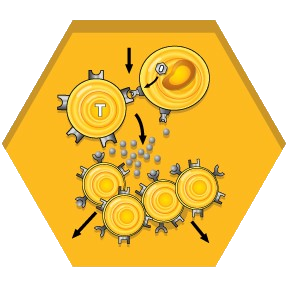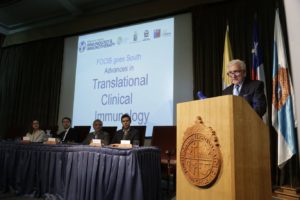November 15 – 18, 2021
9:00 am – 7:00 pm
Chilean Advanced Course on Molecular and Cellular Translational Immunology
Multiple day course held live virtually

Chilean Advanced Course on Molecular and Cellular Translational Immunology
Multiple day course held live virtually
The course will focus on advances in biomedical immunology, discussing aspects of autoimmune diseases, transplantation, cancer, and infectious diseases, among others. The aim of this course is to contribute to the immunology education of students and trainees in Latin America and to promote the collaboration between FCEs from the region (Argentina, Brazil, Chile, and Uruguay) and abroad. These new scientific interactions could contribute to addressing public health problems that are important for Latin America.
This course is designed for students, postdoctoral trainees, clinicians, investigators, and young scientists interested in translational immunology.
Candidates that wish to present their work will be expected to submit a CV and an abstract describing their scientific activities. Participants will be selected by the organizing committee according to their background and involvement in clinical immunology. Participants will present a poster describing their project and results.
After the course, attendees will be able to:

More than 350 scientists attended the first FOCIS Goes South meeting in 2017, with participants coming from Argentina, Brazil, Uruguay, and Mexico, among other countries.
Over three days, 20 renowned speakers will explore major topics in cellular and molecular immunology – taking you from the bench to the bedside and back again.
Lectures will focus on major topics in cellular and molecular immunology, including innate immunity, B cells, T cells, dendritic cells, cytokines, and mucosal immunity. In the second half of the program, lectures will cover autoimmune disorders and tolerance, cancer, infectious diseases, and immunotherapies, as well as new advances in interventional and clinical immunology.
View the complete course program with speakers and presentation topics below.
Dr. Pablo González, Millennium Institute on Immunology and Immunotherapy, Pontificia Universidad
Católica de Chile
Dr. Alexis Kalergis, Millennium Institute on Immunology and Immunotherapy, Pontificia Universidad Católica
de Chile
Dr. Yvonne Rosenstein, Universidad Nacional Autónoma de Mexico, Cuernavaca
Dr. Jorge Kalil, Universidade de São Paulo
Dr. Marcelo Hill, Institut Pasteur of Montevideo
Dr. Guillermo Docena, Universidad de La Plata
Dr. Ignacio Anegon, INSERM UMR 1064
Contact: focisgoessouth2021@bio.puc.cl
All times are listed in Chile Summer Time Zone (UTC -3) which is the time that the lecture will broadcast.
November 15, 2021
| 09:30-10:30 | Welcome words from Academic Authorities of the Pontificia Universidad Católica de Chile, the Millennium Institute on Immunology and Immunotherapy, Government Authorities, FOCIS Directors, and Organizers of the Course. |
| Advanced Course on Molecular and Cellular Translational Immunology | |
| 10:30-11:00 | Dr. Yvonne Rosenstein: Introduction to the Immune System |
| 11:00-12:00 | Dr. Yvonne Rosenstein: Innate Immunity |
| 12:00-13:00 | Dr. Alexis Kalergis: Antigen Presentation, T Cell Activation, and Co-stimulation |
| 13:00-14:00 | Lunch Break |
| 14:00-15:00 | Dr. Alexis Kalergis: CD4 T Cell Subsets, Cytokines |
| 15:00-16:00 | Dr. Alexis Kalergis: B Cells and Antibodies |
| 16:00-17:00 | Dr. Yvonne Rosenstein: T Cell Regulation and Tolerance. Central and Peripheral Tolerance, Failure of Tolerance |
| 17:00-17:30 | Break |
| 17:30-18:00 | Dr. Yvonne Rosenstein: Tumor Immunology |
| 18:00-19:00 | Dr. Alexis Kalergis: Infectious Diseases |
| 19:00 | Adjourn for the day |
November 16
| Becton Dickinson Multicolor Flow Cytometry Workshop (course held in Spanish) | |
| 09:00-10:00 | Introduction and welcome
Flow Cytometry brief history: A multiparametric techniques cell analysis. Rodrigo Pestana (Medical and Scientific Affair Manager BD LATAM) Flow Cytometry Core Facility at the Pontificia Universidad Católica: Present and prospects (Alex Cabrera Nuñez, Flow Cytometry Core, School of Biological Sciences, Pontificia Universidad Católica de Chile) |
| 10:00-10:45 | Novel Fluorochromes and Panel Assembly in Conventional and Spectral Flow Cytometry (María Bernarda Ganem, Medical and Scientific Affairs Specialist BD Argentina |
| 10:45-11:30 | Reading Optimization and Compensation in High Parameter devices (María Bernarda Ganem) |
| 11:30-12:15 | Single Cell Multiomics: fundamentals and applications for immunology assays (Cynthia Safofsky, Sr. Scientist at BD San José-USA) |
| 12:15-13:15 | Spectral Flow Cytometry: new technologies to enhance High Parameter assays. (Robert “Bob” Balderas, Vice-President at BD-Biological Sciences- San José-USA) |
| 13:15-14:15 | Lunch Break |
| 14:15-15:45 | Multicolor Flow Cytometry Case Analysis Workshop: Basis for an Orderly and Efficacious Analysis (Ariel Podhorzer, Field Application Specialist BD Argentina) |
| 15:45-16:30 | Break |
| 16:30-17:45 | Case Analysis in Multicolor Flow Cytometry Workshop: Automatic Offline Compensation. Workshop conclusions (Ariel Podhorzer) |
| 17:45 | Adjourn for the day |
November 17
| 09:00-09:30 | Welcome words and Presentation of the Workshop. |
| Session 1: Autoimmune Diseases. (09:30-11:00) | |
| 09:30-10:15 | Prof. Leonie Taams (King’s College London): Phenotypic and Functional Analysis of CD4+ and CD8+ T cells from the Inflamed Joints of Patients with Rheumatoid Arthritis or Psoriatic Arthritis (Focusing on IL-17 Producing T cells) |
| 10:15-11:00 | Dr. Kristine Kuhn (University of Colorado Health University of Colorado Hospital): Mucosal mechanisms in the development of inflammatory arthritis |
| Session 2: Translational Medicine. (11:00-12:30) | |
| 11:00-11:30 | Dr. Susan Bueno (Pontifical Catholic University of Chile): Immune Response Induced by an Inactivated Vaccine for COVID-19 in Humans |
| 11:30-12:00 | Dr. Maria-Grazia Roncarolo (Stanford University): Regulatory T cells and Immune Tolerance |
| 12:00-12:30 | From 12:00 to 13:00, a parallel lecture session will take place. Participants may choose which lecture to attend on the virtual platform |
| Dr. Michel Neunlist (Institut des Maladies de l’ Appareil Digestif, Université de Nantes): The enteric nervous system: an actor of gut and brain disorders | |
| Dr. Petra Reinke (Charité – Universitätsmedizin Berlin): Are Regulatory T cells a Realistic Therapeutic Option in Solid Organ Transplantation? | |
| 12:30-13:00 | Dr. Matthias von Herrath (La Jolla Institute for Immunology): Developing novel therapies for type 1 diabetes |
| 13:00 – 13:30 | Lunch Break VIRTUAL POSTER VIEWING. |
| Session 3: Cancer. (13:30-17:00) | |
| 13:30-14:00 | Dr. Olivier Boyer (Pan’ther FCE [Pathophysiology, autoimmunity, neuromuscular diseases, and regenerative therapies], Rouen University Hospital): Cancer immunotherapy: principle and applications of CAR T cells |
| 14:00-14:30 | Dr. Marcela Maus (Harvard University): What’s new in CAR T cells |
| 14:30-15:00 | Dr. Yvonne Rosenstein (Universidad Nacional Autónoma de Mexico): An unsuspected role for CD43, a leukocyte marker, in non-lymphoid tumor cells |
| 15:00-15:30 | Dr. Marcelo Hill (Institut Pasteur de Montevideo): ATMEM176B/inflammasome/ exhausted T cells axis as a pharmacological Target in Cancer Immunotherapy and Coronavirus Disease |
| 15:30-16:00 | Dr. Ana Carrizosa Anderson (Harvard University): Pan-cancer Analyses Reveal New Insights into T cell Dysfunction |
| 16:00-16:30 | Dr. José Chabalgoity (University of Uruguay): Moving Salmonella-based immunotherapies for cancer closer to the clinical scenario |
| 16:30-17:00 | Dr. Flavio Salazar (University of Chile): Advances in tumor cell-based immunotherapy for cancer |
| 17:00-17:30 | VIRTUAL POSTER VIEWING |
| 17:30 | Adjourn for the day |
November 18
| Session: Infectious Diseases. (9:00-11:00) | |
| 09:00-09:30 | Dr. Jorge Kalil (University of Sao Paulo): Development of a Vaccine Against COVID-19 Aiming Humoral and Cellular Immune Response to Avoid disease and Infection |
| 09:30-10:00 | Dr. Noah Butler (University of Iowa): The Activation, Programming, and Metabolism of B cells Responding to Malaria |
| 10:00-10:30 | Dr. Ignacio Anegon (INSERM UMR 1064, University of Nantes FCE, France): A new anti-CD45RC mAb tolerogenic therapy in organ transplantation, GVHD and autoimmunity |
| 10:30-11:00 | Dr. Pablo González (Pontificia Universidad Católica de Chile): Herpes Simplex Virus, a Problem that Requires Attention: Challenges and Opportunities |
| 11:00-12:00 | Lunch Break |
| 12:00-13:30 | VIRTUAL POSTER VIEWING |
| Session: Tolerance. (13:30-17:00) | |
| 13:30-14:00 | Dr. Gabriel Rabinovich (University of Buenos Aires): The Sweet Revolution: Lectins and Glycans in Immune and Vascular Programs |
| 14:00-14:30 | Dr. Guillermo Docena (National University of La Plata): Human Colonic IgE Synthesis and Implications for Food Allergies |
| 14:30-15:00 | Dr. Mark Anderson (University of California, San Francisco): Unlocking Autoimmunity through Outliers |
| 15:00-15:30 | Dr. Magnus Fontes (Institut Roche, France): Systems Immunology and the Immunity State Space-A Computational Invitation to Immunology |
| 15:30-16:00 | Dr. David Klatzmann (Sorbonne University): Polyreactive T cells and the antiviral adaptive immune response |
| 16:00-16:30 | Dr. Hans-Dieter Volk (Charité Universitätsmedizin Berlin): Impact of Immuneaging on Intratissue Homeostasis |
| 16:30-17:00 | Dr. Alessandro Marcello (International Centre for Genetic Engineering and Biotechnology): The ICGEB role in infectious diseases: science and International cooperation |
| 17:00-17:30 | Closing words. Director of the Millennium Institute on Immunology and Immunotherapy. Pontificia Universidad Católica de Chile. |
| 17:30 | Course Adjourned |
Course organizers invite abstract submissions from scientists in all sectors—academia, government, and industry.
All accepted abstracts will be presented in virtual poster sessions.
The first author is the presenting author of the abstract and must register to present the work during the assigned poster session date and time. The poster sessions are unopposed to other sessions.
There is no abstract submission fee. Please use this link to submit an abstract.
Requested Presentation Type and Area: Select the requested presentation type (poster only), and the subject area. The subject area options are immunology, autoimmunity, cancer.
Abstract Title: The first letter of all major words should be capitalized (excludes: the, at, and, etc.), with no punctuation at the end. The maximum word count is 100.
Content / Abstract Text: Type or copy/paste the abstract text. The text is limited to a 250-word count. Graphic elements, such as charts, pictures, etc. may not be included in the abstract submission.
Financing: List financing sources for this work if any. The maximum word count is 100.
Keywords: Type up to three (3) keywords of the abstract.
Author Information: The presenting author must submit the abstract and will receive confirmation and acceptance notice. Co-authors may be added. Each co-author requires first name, last name, email address, institution name, city, state, and country. Co-authors must be ordered as they should appear.
If the abstract is accepted by the reviewers, the presenting author will receive an abstract acceptance notification. Notifications of acceptance or rejection will be sent the week of November 5 to the presenting author.
Presenting authors of accepted abstracts must register for FOCIS Goes South 2021 by November 12, 2021. Upon registration, the abstract will be confirmed and scheduled into the program.
Abstracts accepted for presentation but not registered by the deadline will be withdrawn.
Register Online
Online registration is open and closes on Friday, November 12, 2021.
Registration Rate
Attendance is free, but registration is required. Registration includes access to the course live stream, access to speaker-approved session recordings, and a certificate of participation.
This is an ICGEB Workshop & FOCIS Course.
Contact the course hosts at focisgoessouth2021@bio.puc.cl or contact the FOCIS office at +1 414-359-1670 or info@focisnet.org.